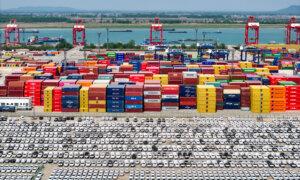One proclamation opens Pacific Ocean waters to commercial fishing for American fleets.
President Donald Trump directed support for the American seafood industry with a series of orders signed in the Oval Office on April 17.
“The United States should be the world’s dominant seafood leader.”
His directive laments that nearly 90 percent of seafood sold in the country is imported. The president blamed the predicament on overregulation and unfair trade practices.
“The erosion of American seafood competitiveness at the hands of unfair foreign trade practices must end,” Trump wrote.
Commerce Secretary Howard Lutnick and Health Secretary Robert F. Kennedy Jr. are directed by the order to immediately consider rescinding or revising existing regulations. Within 30 days, Lutnick is instructed to identify the most burdensome rules and take action to suspend or eliminate them.
Lutnick is also directed to consult with Agriculture Secretary Brooke Rollins to create an “America First Seafood Strategy” with a goal of promoting domestic fishery and aquaculture production and increasing sales through education and outreach programs teaching the public about the health benefits of eating seafood.
Meant to unleash opportunity for fishing companies and bolster the American Samoa economy, which relies on fishing to provide more than 80 percent of the territory’s economic activity, the order permits U.S.-flagged commercial ships to fish within 50 to 200 nautical miles of the national monument’s borders.
Prior to the proclamation, regulations enacted and subsequently expanded by Presidents George W. Bush and Barack Obama prohibited fishing across more than 400,000 square miles of the Pacific Ocean.
Strict regulations caused U.S. fishing fleets to lose access to almost half of the waters included in the nation’s exclusive economic zone surrounding the Pacific Islands, according to the order.
While opening the waters to commercial fishing, the proclamation declares that the natural resources will be adequately managed by existing frameworks, agencies, and oversight councils.
“I find that appropriately managed commercial fishing would not put the objects of scientific and historic interest that the [marine monument regulation] protects at risk,” the order reads.
The proclamation is intended to empower fishermen and support small businesses and communities by reducing regulations that allowed foreign competition to proliferate.
Original News Source Link – Epoch Times
Running For Office? Conservative Campaign Consulting – Election Day Strategies!


